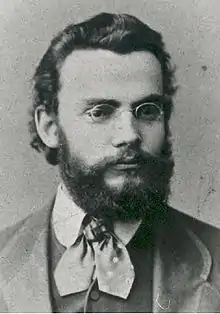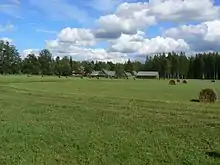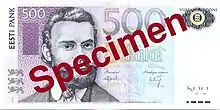Carl Robert Jakobson
Carl Robert Jakobson (26 July [O.S. 14 July] 1841 – 19 March [O.S. 7 March] 1882) was an Estonian writer, politician and teacher active in the Governorate of Livonia, Russian Empire. He was one of the most important persons of the Estonian national awakening in the second half of the 19th century.
Carl Robert Jakobson | |
|---|---|
 | |
| Born | 26 July 1841 |
| Died | 19 March 1882 (aged 40) Kurgja, Governorate of Livonia, Russian Empire |
| Resting place | Kurgja cemetery |
| Nationality | Estonian |
| Occupation |
|
| Movement | Estonian national awakening |
| Family | Eduard Magnus Jakobson (brother) |
Political activity
Between 1860 and 1880, the Governorate of Livonia was led by a moderate nobility-dominated government. Jakobson became the leader of the radical wing, advocating widespread reforms in Livonia. He was responsible for the economic-political program of the Estonian national movement. Jakobson urged Estonians to demand equal political rights with the region's Germans and an end to privileged position of the Baltic-German nobility.
In 1878, Jakobson established the Estonian newspaper Sakala. The paper quickly became a vital promoter of the cultural awakening. He also had a central role in the establishment of the Society of Estonian Literati, which was an influential Estonian association in the second half of the 19th century.
Legacy
Museum

In 1948, the Museum of Carl Robert Jakobson was established by Jakobson's oldest daughter, Linda, in their family estate in Kurgja. The main house of the museum includes an exhibition which introduces the life and activities Jakobson. The museum is designed to illustrate elements of rural life in Estonia during Jakobson's lifetime and remains an active farm with cattle-breeding and land cultivation.[1]
500 kroon note
Carl Robert Jakobson was depicted on the 500 kroon banknote.

References
- "Carl Robert Jakobson Talumuuseum". Archived from the original on 18 May 2015. Retrieved 28 March 2013.